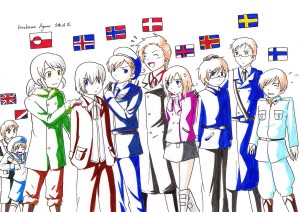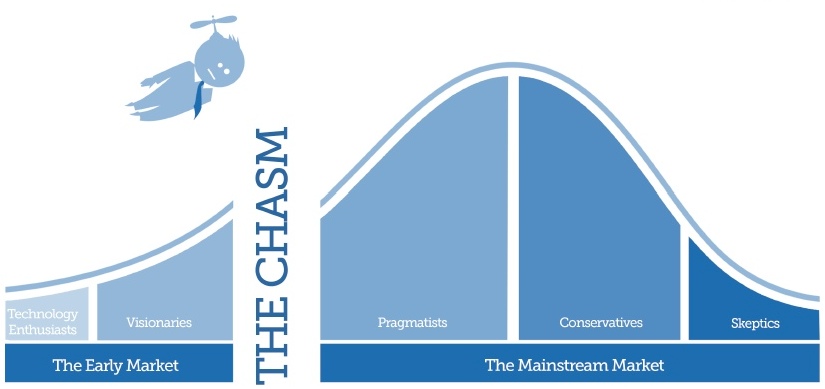Destination The Nordics: Small, but “beautiful.”
It’s expensive to do business in the Nordics. That’s a huge advantage if you are offering software that improves productivity.
I study how software companies outperform their peers. Through my activities, I am in touch with software companies from all over the world that have global growth ambitions. One of the issues, which is always on the agenda, is:
In which sequence we should enter the various foreign markets.
Most web-based companies do not have this issue at first since they mostly start engaging with anyone who has mastered the English language. With 1.5B people in the world prepared to do business in English, we can get a long way before considering Spanish, Portuguese, German, French, Italian, Turkish etc.
Software companies that need salespeople to call on potential customers identifying and activating a need for their solutions [we have a solution -> we need to find potential customers with problems] face different challenges. Even call centre based sales organizations need staff to master the local language of the countries they choose to penetrate. They may not have to be located in the country, but as we grow the operation getting enough local language people to our central call centre (in Dublin or Barcelona) becomes a real challenge.
When your solution requires salespeople on the street visiting potential customers, pre-sales staff doing demo’s, proof-of-concept, pilot projects, implementation and support, then the challenges of entering a new country increases substantially.
Most software companies use language as the first selection criteria. Where can you do more business with the languages that you already master? That’s why most software companies give priority to English speaking countries.
The second criteria is the market size. Perceived market size. Seldom do I get to see a genuine market assessment (e.g. using Alexander Osterwalder’s business model environment framework) for the markets chosen. It is more “Germany is the second-biggest software market in the world. We cannot ignore that.” Of course, you cannot ignore the US, Germany, the UK, France, Italy, Spain etc., but is it always wise to approach these markets in that sequence?
I don’t think so and I can give many examples of software companies that fell flat on their faces and lost millions of dollars wrestling with a “big market” they couldn’t afford to ignore.
I will recommend more software companies with B2B solutions offering business process improvement or personal productivity improvement to take a serious look at the Nordic countries. Each software company should make their own individual assessments before investing, but there are some generic attributes that speak in favour of the Nordics as an excellent gateway to Europe.
Cost of doing business

It is simple, but expensive to do business in the Nordics. Labour costs are very high. That’s a huge advantage for software companies providing business process or personal productivity improvements. Because of the high labour cost both the private sector and the governments are investing heavily in solutions where we can produce more with less. Personal taxes are very high in the Nordics and so are sales taxes. Well, taxes, in general, are horrendous in the Nordics, but not without a reason. The standard of living is very high not only for the few but for the majority of the population.
Just as the cost of doing business is high so is the general price level. Customers are prepared to pay premium prices if you can deliver productivity improvement and quality.
Simplicity
It is simple to do business in the Nordics. There is no corruption, everyone speaks English and we do not suffer from the “big country ego” syndrome. Big country customers consider small companies from abroad to be “offshore” type operations if they do not have a subsidiary with >”100″ people. Big country customers do not consider your lighthouse references in other countries of any value since they are located outside their geography.
Big country customers will be reluctant to deal with you in English (unless that’s their native language) – “if you want to sell to us then you must speak our language.” In the Nordics, we do not expect any foreigners to speak our languages. We are curious and very open to new technology. We are used to being the underdogs and are not afraid of talking to strangers.
If you have something of genuine value that is not already available in the market you can get through the first bootstrapping phase without having to establish a bridgehead first. Customers in the Nordics do not expect companies to invest in local subsidiaries before they have their first customers. If you are a niche provider Nordic customers will even accept to be served from an office abroad. We do recognize the law of gravity and accept that our vendors must make a profit to continue providing us with good service.
“What you know” is more important than “who you know.”
Although personal relationships are important in the Nordics too, you are valued much more for “what you know” than for “who you know.” When it comes to investment decisions we seldom favour our cousin over the “best solution.” If you have something of value we will listen to you.
A no is a no and a yes is a yes
You also need salespeople in the Nordics that can turn a “no” to a “yes.” However, in general, business people in the Nordics are very direct. We are not afraid of hurting your feelings. Thus the communication is open and honest with little need for decoding and interpretation. You can reciprocate and tell us what you really think. We always prefer an honest opinion over-polite pretending.
Your competitors are in Germany and the UK
The competitive pressure in the Nordics is much lighter than in the big markets. The domestic incumbents are typically smaller companies than those you will have to compete with in the big countries. While all your competitors rush for the USA, UK, Germany etc. you can build muscle in the Nordics first then take the bigger markets next.
In Germany, you are small fry. In Denmark, you are a big fish.
Although the law of diffusion of innovation also applies in the Nordics I will claim that we have a larger share of early adopters than in big countries including the USA. Nordic companies are globally oriented. With the relatively small domestic markets Nordic companies “go global” very early in their life cycle. They have to find innovative approaches to deal with global competition because they are almost always much smaller than their foreign competition. In the Nordics, we have a different perception of what is a big company. It’s more important how you can contribute than how many employees you have.
A word of caution

In this post, I have been conveying the perception that the Nordics is a single homogeneous market. That is not the case. Denmark, Norway, Sweden, Finland and Iceland are different markets, but they all share the attributes mentioned in my post. Each country has its own language, the industrial demand patterns are different and the business decision-making processes are very different. You need a local mahout to guide you in each of the countries.











